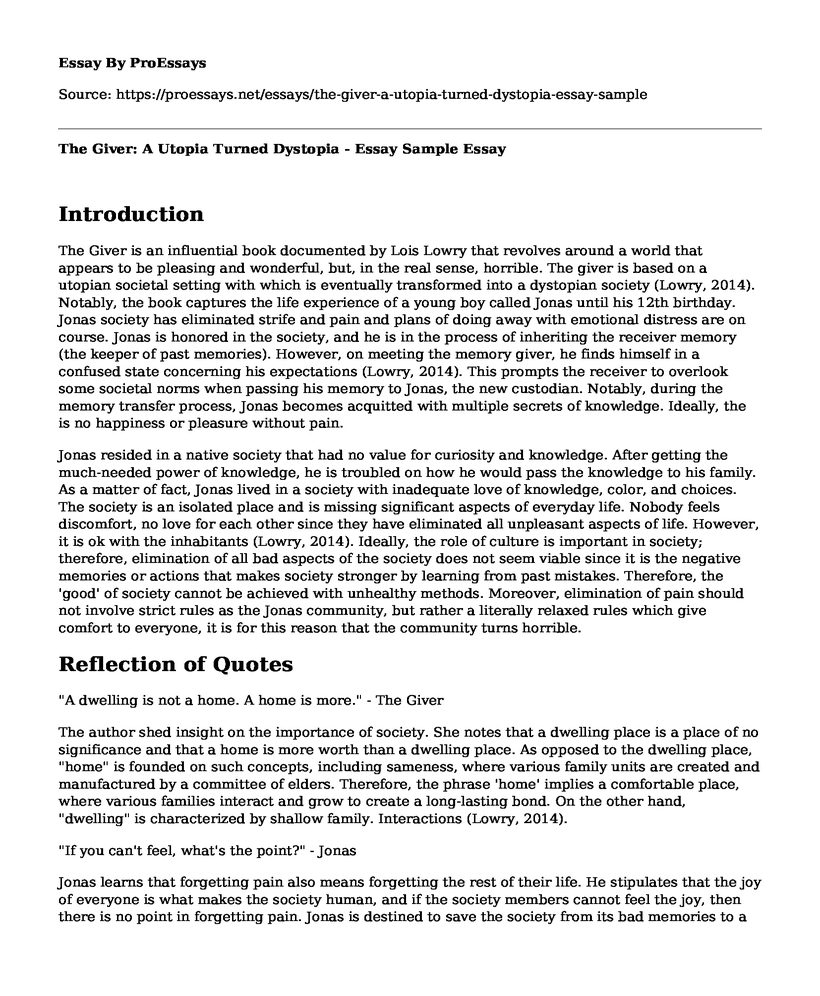Introduction
The Giver is an influential book documented by Lois Lowry that revolves around a world that appears to be pleasing and wonderful, but, in the real sense, horrible. The giver is based on a utopian societal setting with which is eventually transformed into a dystopian society (Lowry, 2014). Notably, the book captures the life experience of a young boy called Jonas until his 12th birthday. Jonas society has eliminated strife and pain and plans of doing away with emotional distress are on course. Jonas is honored in the society, and he is in the process of inheriting the receiver memory (the keeper of past memories). However, on meeting the memory giver, he finds himself in a confused state concerning his expectations (Lowry, 2014). This prompts the receiver to overlook some societal norms when passing his memory to Jonas, the new custodian. Notably, during the memory transfer process, Jonas becomes acquitted with multiple secrets of knowledge. Ideally, the is no happiness or pleasure without pain.
Jonas resided in a native society that had no value for curiosity and knowledge. After getting the much-needed power of knowledge, he is troubled on how he would pass the knowledge to his family. As a matter of fact, Jonas lived in a society with inadequate love of knowledge, color, and choices. The society is an isolated place and is missing significant aspects of everyday life. Nobody feels discomfort, no love for each other since they have eliminated all unpleasant aspects of life. However, it is ok with the inhabitants (Lowry, 2014). Ideally, the role of culture is important in society; therefore, elimination of all bad aspects of the society does not seem viable since it is the negative memories or actions that makes society stronger by learning from past mistakes. Therefore, the 'good' of society cannot be achieved with unhealthy methods. Moreover, elimination of pain should not involve strict rules as the Jonas community, but rather a literally relaxed rules which give comfort to everyone, it is for this reason that the community turns horrible.
Reflection of Quotes
"A dwelling is not a home. A home is more." - The Giver
The author shed insight on the importance of society. She notes that a dwelling place is a place of no significance and that a home is more worth than a dwelling place. As opposed to the dwelling place, "home" is founded on such concepts, including sameness, where various family units are created and manufactured by a committee of elders. Therefore, the phrase 'home' implies a comfortable place, where various families interact and grow to create a long-lasting bond. On the other hand, "dwelling" is characterized by shallow family. Interactions (Lowry, 2014).
"If you can't feel, what's the point?" - Jonas
Jonas learns that forgetting pain also means forgetting the rest of their life. He stipulates that the joy of everyone is what makes the society human, and if the society members cannot feel the joy, then there is no point in forgetting pain. Jonas is destined to save the society from its bad memories to a more colorful and alive community, and he expects the society to feel joyful and forget their past memories for his goal to be achieved (Lowry, 2014).
"Be curious." - The Giver
The giver used this quote to depict the human nature of curiosity of knowing everything concerning life. He expected Jonas to ask and be curious to all that appertains to the power of knowledge. This helps Jonas in gaining significant knowledge about his community and later becomes curious about transferring the knowledge to his family members.
"People are weak. People are selfish. When people have the freedom to choose, they choose wrong, every single time." - The Chief Elder
The community members are not allowed to make any decision concerning their lives. Everything is in order and under control of the elders. Pain and war do not exist, and thus the elders feel that if people are allowed to make their decision, they would decide otherwise every time. However, Jonas discovers this and has got a different opinion. Ideally society should embrace freedom of expression.
Reference
Lowry, L. (2014). The Giver Quartet Omnibus. Houghton Mifflin Harcourt. "The Utopian Function of Memory in Lois Lowry's The Giver." Doi.org/10.3828/extr.2009.50.1.5
Cite this page
The Giver: A Utopia Turned Dystopia - Essay Sample. (2023, Jun 22). Retrieved from https://proessays.net/essays/the-giver-a-utopia-turned-dystopia-essay-sample
If you are the original author of this essay and no longer wish to have it published on the ProEssays website, please click below to request its removal:
- The Pollution Caused by Oedipus - Essay Sample
- Compare and Contrast Essay on The Great Gatsby Novel and Movie
- Essay Sample on Presumption of Innocence
- Symbolism in The Picture of Dorian Gray Essay
- Macbeth: An Exploration of Remarkable Character Evolution Through Political Ambition - Essay Sample
- Essay Example on Chaucer on Women: Obedience & Virgin Mary
- Mary Shelley Frankenstein - Essay Sample







